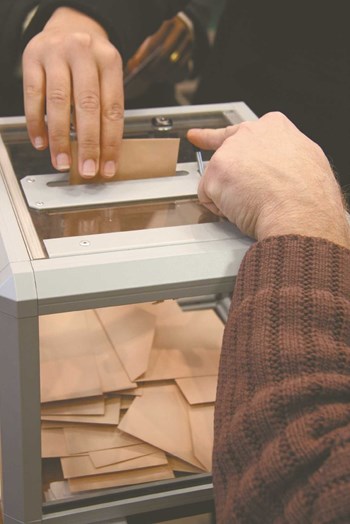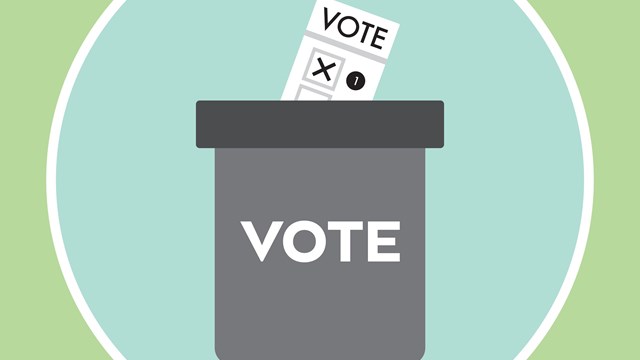
Election season typically starts around Labor Day, when we start to be bombarded with reminders to cast our ballots to choose who we want to be in charge of our city, town, state and country. It ends on Election Day in November, when the voting is completed, the tallying is done and a winner is announced. In a co-op or a condo association, a similar type of annual election process takes place—an election to choose a board of directors that will work with the building’s manager to make sure the community’s finances, physical maintenance and other day-to-day business remains solvent and sound.
When it comes to actually running the elections, however, the biggest concern among those involved is making sure the elections are fair and balanced and nobody has a reason to cry foul. Elections can be heated enough as it is, so the voting process should run smoothly and without any hiccups. Linda Gibbs, president of Honest Ballot Association in Floral Park, remembers one extremely heated election she monitored where physical fighting even broke out. “It was bad,” she says.
Sometimes the problem is that members of the board do not want to give up their power, says Adam Leitman Bailey, Esq., a Manhattan-based real estate attorney with his own practice. Bailey says, “The co-op board will do everything they can to stay in power. So what they do is they make sure only their names are listed on the ballots going out.” Bailey notes that in many instances this is legal, “but it's kind of unfair because it inclines owners to vote for the people who are in the list.”
Another important point that Bailey makes is that to maintain their power, the board, “doesn't educate the shareholders on how to run for election. The board of directors has an attorney giving them advice on how to follow all the rules to stay in power, but not advising them of how to actually get someone onto the ballot in the first place. Accordingly, the residents of the buildings don't realize that with this sophisticated board, they can't disrupt the meeting and win the election.”
So what can be done to unseat these intransigent board members? Bailey says, “You have to be a sneak campaign. But the way to win an election is through proxies. So proxies are everything. So the smart shareholders that went through an election know to start collecting proxies early. A proxy is a document whereby someone else gives up the right to vote and allows you to vote for whoever you want as the person holding a proxy. So the key to an election is the proxies.”
Bailey notes though that boards, in trying to maintain power, sometimes participate in some unsettling practices, “We had one case where the board limited who can run for office. One example was we said anyone that's running for board had to graduate high school. That was a pretty big case. It was a really important decision.
And the court overruled that...limitations on voting is not common, but it happens.”
So is the term ‘fair election’ an oxymoron? Although unfair elections—where there have been broken voting machines or improper ballot counting—make front page news, the truth is that it’s not common for elections to be unfair, at least technically speaking. On the other hand, it’s pretty easy to have a fair election for a co-op or condo board if these few basic guidelines are followed.
Follow the Bylaws
Check the bylaws to find out how often your elections should be held, and when. Typically, elections are held annually. Bailey explains that, “Oftentimes the elections will be at the annual meeting, and the annual meeting usually fixes a date. The date is usually chosen in the bylaws or is listed in the offering plan where it states that the election will be once a year out and it will be the same date as when the first annual meeting occurs.”
Bailey points out though that if a building is several years old, no one on the board may know when the meeting should be. He suggests that, “they should call in management immediately to try to find that out, and determine the range of dates and make sure that you're actually there.”
The scheduling of the annual meeting is another way that many board members use as a way to stay in power. Bailey recounts, “I saw one board where the way they got around having a fight in the elections is they made the election at 5:00. That's when people are working. So they limited who came to the annual meeting and they made sure their friends were there.”
“The great way to avoid this is to send out a memo, long before the election date,” says Bailey, “[the memo should] describe the election process and ask for board members, telling them what qualifications they need, and getting the word out that there are positions available and they can run. Many buildings today have websites where the memo can be posted, but, like in my co-op they post it on the community board.”
Get Outside Help
If your board doesn’t want to be personally responsible for administering the election, an outside vendor can run the election. The vendor can handle a part of the event, such as tallying up the votes, or they can run the entire election.
Gibbs' company was actually founded by Theodore Roosevelt in 1909. “He started this association because he wanted to have honest and fair elections and it’s what I go by,” says Gibbs, who runs elections for co-ops, condos, unions, associations and some counties. “I’ve worked on terraces if the lobby is too hot, a local school or church if the building doesn’t have a place to hold an election—even in a laundry room.”
It’s definitely not a fair election if the people aren’t there to vote, so make sure to spread the word that it’s taking place. Again, the bylaws will let you know how to do that. “It’s not a law, but the bylaws say that you must notify everybody at least 10 days before an event. “The board should notify each shareholder in the method in which it normally communicates with shareholders,” says Steven Glassberg of the law firm of Glassberg & Associates, LLC in New York City. “If it’s a statement with the maintenance, also posting in elevators and other common areas is a good idea.”
Once the word has been spread, it’s time to conduct the voting.
“How we do the voting depends on the election,” says Gibbs. “We can do a machine vote, touch screen, scanners or paper—it all depends on the building and the community.”
Prepare the Proxies
Not everyone can make an election, but they still want their votes to count and that’s where the proxy comes in. “Proxies allow a unit owner to vote even if they aren’t present at the election,” says Bailey. The owner must designate a proxy in a duly-executed writing. Usually co-ops and condos provide a form for this that is distributed to apartment owners in advance of the meeting. The goal is to get enough apartment owners voting by proxy to supplement those actually attending, and yield the majority necessary to conduct the election. In the proxy, the unit owner can either designate the board members for whom the proxy must vote, or give discretion to the proxy to vote as they see fit.
Proxies are revocable, which means the unit owner can change his or her mind, and they expire after eleven months. “Proxies are sometimes difficult for shareholders to understand,” says Gibbs. “In my opinion, it’s always been a hassle with them because people complain that others have gone out and gotten proxies. Any proxy will hold up in court, even if you wrote it on toilet tissue, as long as the property lease owner is in the apartment. They can always designate someone to vote for them.”
Count the Votes
With all the ballots and proxies in, it’s time to tally up the votes and see if John Q. Smith won a seat on the board of directors. “Most boards do it by secret ballot where each shareholder writes the name down of the person they are voting for and the results are tallied in the same meeting by the board members who are remaining on the board, usually the secretary,” says Glassberg.
Companies like Gibbs’ can also do the counting, says Bailey, but more often than not the board will try to have the election themselves. Bailey notes that counting the votes is, “another big issue, another place where fraud comes up. There's the inspectors of the election that are chosen, and they collect the votes and they... My favorite is when they have a lock-box, it's placed into a box that's locked. I also recommend to all my clients that they do not count at the meeting, because you don't want any riots or chaos. There's the Inspector General that's appointed, that's in the bylaws, the Inspector General gives the lock-box to the management company. And so when they trust, the managing agent counts it, and then reports the results.”
Demand a Recount!
Well not really. Typically recounts are not demanded or conducted unless a small number of votes determined who was elected or there is some suspicion that the counting was not properly conducted. According to Bailey, a unit owner can seek court review of the count or any other aspects of the election by filing a petition with the court within four months after the election.
Like fingerprints and snowflakes, every election is different and unique and can bring with it a host of excitement and problems.
“Some of these are treated like wars. Some of these they fight harder than they would in the Presidency of the United States,” says Bailey. “And they campaign, and for our clients that are on Park Avenue, sometimes the work that's put into these elections, is enormous. I mean, based on the amount of units and people versus the amount of people in the U.S., I bet you that, we have higher spending on campaigns per person, than the Presidential election, in some cases. Some of these are a really big deal.”
“There are lots of challenges,” says Gibbs, who says that she has seen it all from a very highly contested election where there were more proxies than people to an election that was hotly-contested because owners claimed the board was crooked.
Overall, Gibbs says integrity is the watchword for those people who are running for the board and also for those who are monitoring the election.
While there may not be any hanging chads as there were in the controversial 2000 Presidential Election, conducting an election fairly is an integral part of our democratic society. With the help of competent legal and management professionals, and possibly that of an outside tabulation company, your building’s elections can go smoothly and successfully.
Lisa Iannucci is a freelance writer living in Poughkeepsie, N.Y. and a frequent contributor to The Cooperator.






5 Comments
Leave a Comment